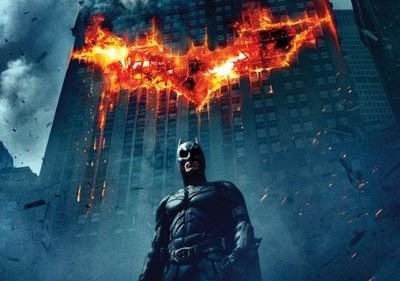Hollywood After September 11, 2001
How the 9/11 attacks have affected popular movies, particularly blockbusters
The shadow of September 11, 2001 over Hollywood still lingers.

Not that the attacks themselves, or their impact on those most affected, were ever a notable topic in popular Hollywood entertainments. But the trauma of that day of infamy and of the weeks and months that followed left lasting marks on the images and themes driving popular entertainments from War of the Worlds and The Dark Knight to Star Trek Into Darkness and Guardians of the Galaxy.
Hollywood’s initial response to 9/11 was to recoil from anything that might remind viewers of the World Trade Center or the attacks, on the theory that the public appetite for big-screen mayhem had been squelched. Instead, DVD rentals for escapist action fare like Die Hard and Independence Day soared. In the face of so great a trauma, mere distraction wasn’t enough: Viewers wanted something more like exorcism.
At first connections to September 11 were accidental: clouds of smoke rising over a city skyline in Ridley Scott’s gripping Black Hawk Down (2001), for instance. In time, the impact of the attacks began to percolate through Hollywood’s collective imagination. Disney’s Ladder 49 (2004), a sentimental valentine to big-city firefighters, was inspired by the heroism of “New York’s bravest.”
A pair of 2005 action fantasies boldly reworked images and motifs from the attacks and the subsequent “war on terror.” Steven Spielberg’s slick alien-invasion picture War of the Worlds was the more obvious of the two, dealing effectively if rather one-sidedly with the trauma — dust-covered survivors, missing-persons displays with photos of loved ones — but offering little sense of the solidarity and heroism occasioned by catastrophe.
Christopher Nolan’s Batman Begins was more provocative, with an al-Quaeda–esque secret society dedicated to exterminating decadent societies through weapons of mass destruction. Nolan further developed these themes in The Dark Knight (2008) and The Dark Knight Rises (2012), creating arguably the most ambitious superhero trilogy ever made. (One writer called The Dark Knight “the ultimate 9/11 movie.”)
And of course it wasn’t just Batman. Superhero movies had already started to come back as early as X-Men in 2000, but their complete dominance in subsequent years probably owes something to 9/11. Some heroes, such as Robert Downey Jr.’s Tony Stark in Jon Favreau’s witty Iron Man (2008), actually became involved in Middle Eastern terrorism and the consequences of misguided American involvement abroad. More recently, Captain America: The Winter Soldier explored the post-Patriot Act era surveillance state.
After decades of campy exploits, the producers of the James Bond franchise reportedly felt that a more serious, self-critical tone was called for in a post-9/11 world. The masterful reboot/origin story Casino Royale (2006) plays as a kind of commentary and critique of the prior Bond franchise, bringing moral and psychological perspective to their tradition of romanticized amoral violence and sexuality.
2006 also saw Hollywood’s two most direct attempts to tackle the actual events of 9/11. The first, and by far the best major film on the subject, was Paul Greengrass’s powerful United 93, which recreated with compelling naturalism the awful sense of crossing a threshold from a pre-9/11 world to a post-9/11 world — and how that transition led to the one moment of bittersweet victory on that day of defeat. The other, Oliver Stone’s World Trade Center, was a more conventional Hollywood melodrama wobbling between sincerity and cliché.
For a long time it was impossible to watch urban destruction set pieces without thinking of Ground Zero; as Justin Chang wrote in Variety a few years ago, “any contemporary film offering up a scenario of mass annihilation is, like it or not, a 9/11 movie.” By this standard, 9/11 films include everything from Michael Bay’s Transformers movies to the likes of Star Trek Into Darkness and Man of Steel (both 2013). Even Guardians of the Galaxy, a goofy sci-fi romp in outer space, ends with a hostile alien warship crash-landing into an alien cityscape.
Images of urban devastation are so ubiquitous in action movies that it’s a relief to run across one, such as this summer’s terrific X-Men: Days of Future Past, that doesn’t raze city blocks or destroy skyscrapers. (It also included a set piece in the Pentagon!) Yet the summer’s Dawn of the Planet of the Apes, which does features widespread urban destruction and a blown-up skyscraper, arguably does so without evoking 9/11.
Neither apes nor humans are the bad guys; instead, there are aggressors and peacemakers on both sides, and our sympathies are with the peacemakers against the aggressors. Watching a potentially salvageable situation deteriorate, I think less of the war on terror than of various escalating situations around the globe right now where voices of reason are shouted down or silenced. It will be a long time yet before the shadow of 9/11 fades, but as the world goes on it will increasingly be overshadowed by more recent events.
Notes on age appropriateness: Captain America: The Winter Soldier; Dawn of the Planet of the Apes, Guardians of the Galaxy, Iron Man, X-Men: Days of Future Past: teens and up. Batman/Dark Knight trilogy, Black Hawk Down, The Bourne Identity, Casino Royale: mature viewing. Other films mentioned are not necessarily recommended.
Recent
- Benoit Blanc goes to church: Mysteries and faith in Wake Up Dead Man
- Are there too many Jesus movies?
- Antidote to the digital revolution: Carlo Acutis: Roadmap to Reality
- “Not I, But God”: Interview with Carlo Acutis: Roadmap to Reality director Tim Moriarty
- Gunn’s Superman is silly and sincere, and that’s good. It could be smarter.
Home Video
Copyright © 2000– Steven D. Greydanus. All rights reserved.